Photographs: Stringer/Reuters Devjyot Ghoshal in Kolkata
Kolkata is one place where domestic water supply isn't billed. The Hooghly river is the primary source and there's no supply crisis looming, unlike some other cities.
Also, there are no charges for supplying water, for the most part.
The Kolkata Municipal Corporation, which administers an area of about 185 sq km, pegs water demand at 290 million gallons per day (mgd), and claims it supplies about 300 mgd on an average.
However, most of Kolkata's water connections have no apparatus for volumetric measurement. KMC officials say 94 per cent of the city is supplied piped water, but there are no meters installed at residences, So the municipal body is unable to properly monitor supply across its command area.
Consequently, while some areas of the city get up to 20 hours of continuous water supply every day, there are also neighborhoods that receive only five hours daily. further. . .
Kolkata has enough water, yet there's a problem
Image: A horse-cart passes in front of the Queen Victoria Memorial in Kolkata.Photographs: Jayanta Shaw/Reuters
There is an issue with groundwater, as much of it is hard water, and there is also an arsenic contamination problem. In many slums in the city, residents use KMC's piped water for cooking and use groundwater for washing, bathing, etc.
Although, the KMC is aware of the wastage taking place, it can't do much in the absence of meters. They have mulled a flat charge on using KMC-supplied water but that is unlikely to stop wastage, as consumers will continue to use more than what is actually required, officials feel.
And, as there is no looming crisis, usage of recycled water in commercial and residential properties is not the norm and there is no visible governmental drive for the same.
"We have a vague idea of how much water goes to which part of the city because we've been working with this system for quite some time now. But we can't measure exactly how much water is being used by which part of the city and alter our supply pattern accordingly. Volumetric measurement is essential and we need to install water meters," says a senior official of KMC's water supply department.
Kolkata has enough water, yet there's a problem
Image: A homeless girl carries a pot of water in Kolkata.Photographs: Jayanta Shaw/Reuters
In 2007, the Kolkata Environment Improvement Project -- a multi-agency body funded by the Asian Development Bank, the West Bengal government and the KMC -- secured a $113.6 million (Rs 532 crore -- Rs 5.32 billion) loan, of which a component was to be used for the procurement of water meters.
However, the project was not favoured by the principal opposition party, the Trinamool Congress, and some parties of the incumbent Left Front, and is stuck.
KMC officials admit the implementation of water meters in the city is on the back burner. "It is unlikely that anything will move forward before the next elections. It has turned into a political issue now," said an official.
Kolkata has enough water, yet there's a problem
Image: A street urchin cools himself with water from a metal pot in Kolkata.Photographs: Jayanta Shaw/Reuters
On its part, though, the KEIP said the Rs 9-crore (Rs 90 million) tender for about 15,000 water meters had been held up due to other reasons. "We have already received bids and these have been evaluated. However, the quotations were on the higher side and we have referred this to the ADB. We will either re-negotiate or undertake the bidding process again," a KEIP official said.
But the delay is hitting the coffers of the KMC's water department. Although the department is not financially independent of the larger municipal body, it spent approximately Rs 140 crore (Rs 1.40 billion) last year, most of which was towards operational and maintenance expenses.
In terms of income, it netted about Rs 30 crore (Rs 300 million), which came from its 7,000 commercial connections, 220 bulk meters at large complexes, as well as some indirect tapping from trade licences, according to KMC sources. The funding gap is substantial.
Moreover, streamlining of operational and maintenance costs and installing meters is essential for attracting central funds. Of the approximately Rs 750 crore (Rs 7.50 billion) of new projects the KMC's water department is currently undertaking, a significant portion is being funded by the Centre through the Jawaharlal Nehru National urban Renewal Mission, an official said.
Kolkata has enough water, yet there's a problem
Image: A worshipper pours water from the river Ganga back into the river in Kolkata.Photographs: Jayanta Shaw/Reuters
In the interim, the water department is trying to utilise its present resources. It is replacing a large part of the 5,000-km network of pipes that service the city, as well as improving its grievance addressal system.
Presently, customers with complaints must file these with one of the 34 offices of the department, which are then attended to by local workmen.
"We have now introduced an electronic system that will allow us to monitor complaints centrally. This way, we'll be able to better identify areas with chronic problems and find a long-term solution," said an official.
However, the difficulties of managing one of India's largest urban water distribution systems without adequate data on actual supply remain evident.

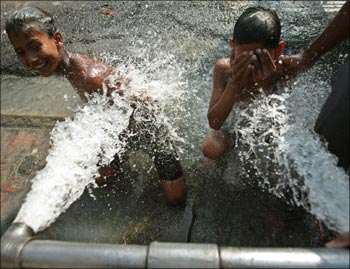
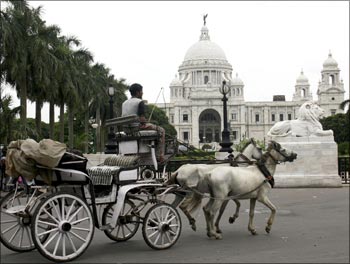
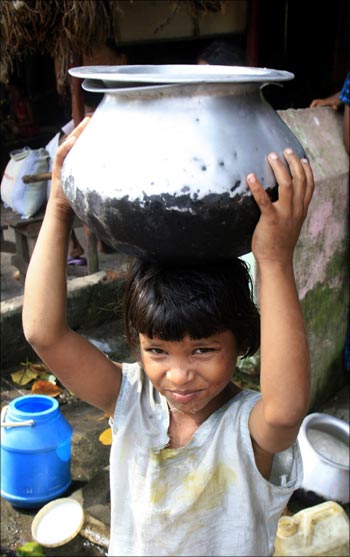
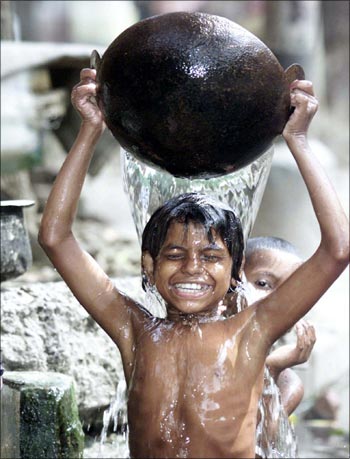
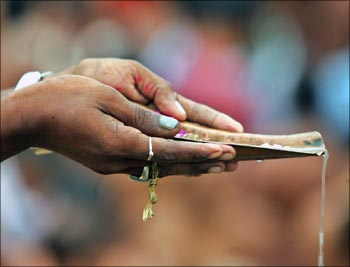

article